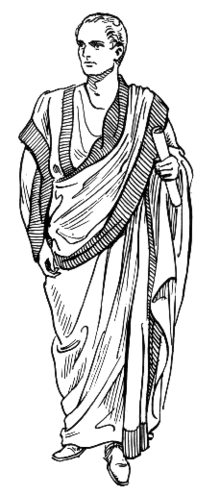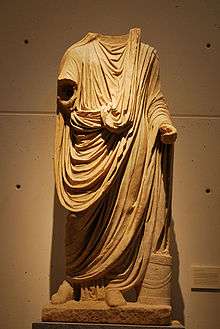Definify.com
Webster 1913 Edition
Toga
‖
To′ga
,Noun.
pl. E.
Togas
(#)
, L. Togae
(#)
. [L., akin to
tegere
to cover. See Thatch
.] (Rom. Antiq.)
The loose outer garment worn by the ancient Romans, consisting of a single broad piece of woolen cloth of a shape approaching a semicircle. It was of undyed wool, except the border of the toga praetexta.
‖
Toga praetexta
. [L.]
, a toga with a broad purple border, worn by children of both sexes, by magistrates, and by persons engaged in sacred rites.
– ‖Toga virilis
[L.]
, the manly gown; the common toga. This was assumed by Roman boys about the time of completing their fourteenth year.
Definition 2026
Toga
toga
toga
English

A toga.
Noun
toga (plural togas or togae or togæ)
Derived terms
Translations
loose outer garment worn by the citizens of Rome
loose wrap gown
See also
Anagrams
Finnish
Noun
toga
- Alternative form of tooga
Declension
| Inflection of toga (Kotus type 10/koira, no gradation) | |||
|---|---|---|---|
| nominative | toga | togat | |
| genitive | togan | togien | |
| partitive | togaa | togia | |
| illative | togaan | togiin | |
| singular | plural | ||
| nominative | toga | togat | |
| accusative | nom. | toga | togat |
| gen. | togan | ||
| genitive | togan | togien togainrare |
|
| partitive | togaa | togia | |
| inessive | togassa | togissa | |
| elative | togasta | togista | |
| illative | togaan | togiin | |
| adessive | togalla | togilla | |
| ablative | togalta | togilta | |
| allative | togalle | togille | |
| essive | togana | togina | |
| translative | togaksi | togiksi | |
| instructive | — | togin | |
| abessive | togatta | togitta | |
| comitative | — | togineen | |
Icelandic
Etymology
From Old Norse toga, cognate with English tow.
Pronunciation
- IPA(key): /ˈtʰɔːɣa/
- Rhymes: -ɔːɣa
Verb
toga (weak verb, third-person singular past indicative togaði, supine togað)
- (transitive, intransitive, governs the accusative) to pull, to draw, to tug syn.
- (transitive, intransitive, governs the accusative) to trawl
Inflection
toga — active voice (germynd)
| infinitive (nafnháttur) |
að toga | ||||
|---|---|---|---|---|---|
| supine (sagnbót) |
togað | ||||
| present participle (lýsingarháttur nútíðar) |
togandi | ||||
| indicative (framsöguháttur) |
subjunctive (viðtengingarháttur) |
||||
| present (nútíð) |
ég toga | við togum | present (nútíð) |
ég togi | við togum |
| þú togar | þið togið | þú togir | þið togið | ||
| hann, hún, það togar | þeir, þær, þau toga | hann, hún, það togi | þeir, þær, þau togi | ||
| past (þátíð) |
ég togaði | við toguðum | past (þátíð) |
ég togaði | við toguðum |
| þú togaðir | þið toguðuð | þú togaðir | þið toguðuð | ||
| hann, hún, það togaði | þeir, þær, þau toguðu | hann, hún, það togaði | þeir, þær, þau toguðu | ||
| imperative (boðháttur) |
toga (þú) | togið (þið) | |||
| Forms with appended personal pronoun | |||||
| togaðu | togiði * | ||||
| * Spoken form, usually not written; in writing, the unappended plural form (optionally followed by the full pronoun) is preferred. | |||||
| infinitive (nafnháttur) |
að togast | ||||
|---|---|---|---|---|---|
| supine (sagnbót) |
togast | ||||
| present participle (lýsingarháttur nútíðar) |
togandist ** ** the mediopassive present participle is extremely rare and normally not used; it is never used attributively or predicatively, only for explicatory subclauses |
||||
| indicative (framsöguháttur) |
subjunctive (viðtengingarháttur) |
||||
| present (nútíð) |
ég togast | við togumst | present (nútíð) |
ég togist | við togumst |
| þú togast | þið togist | þú togist | þið togist | ||
| hann, hún, það togast | þeir, þær, þau togast | hann, hún, það togist | þeir, þær, þau togist | ||
| past (þátíð) |
ég togaðist | við toguðumst | past (þátíð) |
ég togaðist | við toguðumst |
| þú togaðist | þið toguðust | þú togaðist | þið toguðust | ||
| hann, hún, það togaðist | þeir, þær, þau toguðust | hann, hún, það togaðist | þeir, þær, þau toguðust | ||
| imperative (boðháttur) |
togast (þú) | togist (þið) | |||
| Forms with appended personal pronoun | |||||
| togastu | togisti * | ||||
| * Spoken form, usually not written; in writing, the unappended plural form (optionally followed by the full pronoun) is preferred. | |||||
togaður — past participle (lýsingarháttur þátíðar)
| strong declension (sterk beyging) |
singular (eintala) | plural (fleirtala) | |||||
|---|---|---|---|---|---|---|---|
| masculine (karlkyn) |
feminine (kvenkyn) |
neuter (hvorugkyn) |
masculine (karlkyn) |
feminine (kvenkyn) |
neuter (hvorugkyn) |
||
| nominative (nefnifall) |
togaður | toguð | togað | togaðir | togaðar | toguð | |
| accusative (þolfall) |
togaðan | togaða | togað | togaða | togaðar | toguð | |
| dative (þágufall) |
toguðum | togaðri | toguðu | toguðum | toguðum | toguðum | |
| genitive (eignarfall) |
togaðs | togaðrar | togaðs | togaðra | togaðra | togaðra | |
| weak declension (veik beyging) |
singular (eintala) | plural (fleirtala) | |||||
| masculine (karlkyn) |
feminine (kvenkyn) |
neuter (hvorugkyn) |
masculine (karlkyn) |
feminine (kvenkyn) |
neuter (hvorugkyn) |
||
| nominative (nefnifall) |
togaði | togaða | togaða | toguðu | toguðu | toguðu | |
| accusative (þolfall) |
togaða | toguðu | togaða | toguðu | toguðu | toguðu | |
| dative (þágufall) |
togaða | toguðu | togaða | toguðu | toguðu | toguðu | |
| genitive (eignarfall) |
togaða | toguðu | togaða | toguðu | toguðu | toguðu | |
Derived terms
- hártogun
- hlaupa eins og fætur toga (to run as fast as one can)
- toga í eitthvað (to pull on something)
- togast
- togast á um (to fight over something, to contend for something)
Synonyms
Latin

statua cum toga (statue with toga)
Etymology
From tegō (“I cover”), related to Ancient Greek στέγω (stégō).
Pronunciation
- (Classical) IPA(key): /ˈto.ɡa/
Noun
toga f (genitive togae); first declension
Inflection
First declension.
| Case | Singular | Plural |
|---|---|---|
| nominative | toga | togae |
| genitive | togae | togārum |
| dative | togae | togīs |
| accusative | togam | togās |
| ablative | togā | togīs |
| vocative | toga | togae |
Derived terms
Terms derived from toga
|
|
|
Descendants
References
- toga in Charlton T. Lewis and Charles Short (1879) A Latin Dictionary, Oxford: Clarendon Press
- Félix Gaffiot (1934), “toga”, in Dictionnaire Illustré Latin-Français, Paris: Hachette.
- Meissner, Carl; Auden, Henry William (1894) Latin Phrase-Book, London: Macmillan and Co.
- to assume the toga virilis: togam virilem (puram) sumere
- to assume the toga virilis: togam virilem (puram) sumere
Northern Sami
Etymology
From Norwegian tog, Swedish tåg.
Noun
toga
Inflection
| Even, no gradation | ||
|---|---|---|
| Nominative | toga | |
| Genitive | toga | |
| Singular | Plural | |
| Nominative | toga | togat |
| Accusative | toga | togaid |
| Genitive | toga | togaid |
| Illative | togii | togaide |
| Locative | togas | togain |
| Comitative | togain | togaiguin |
| Essive | togan | |
| Possessive forms | |||
|---|---|---|---|
| Singular | Dual | Plural | |
| 1st person | togan | togame | togamet |
| 2nd person | togat | togade | togadet |
| 3rd person | togas | togaska | togaset |
Synonyms
- juná (Finland)
Old Irish
Alternative forms
Pronunciation
- IPA(key): /ˈtoɣa/
Verb
toga
- second-person singular imperative of do·goa
Mutation
| Old Irish mutation | ||
|---|---|---|
| Radical | Lenition | Nasalization |
| toga | thoga | toga pronounced with /d(ʲ)-/ |
| Note: Some of these forms may be hypothetical. Not every possible mutated form of every word actually occurs. | ||
Polish
Etymology
Pronunciation
- IPA(key): [ˈtɔɡa]
Noun
toga f
Declension
declension of toga
Portuguese
Noun
toga f (plural togas)
- toga (loose outer garment worn by the citizens of ancient Rome)
